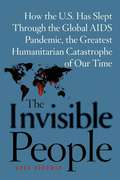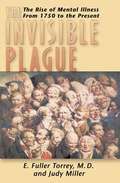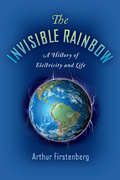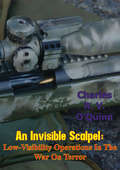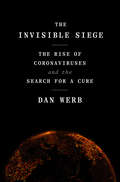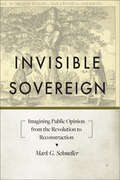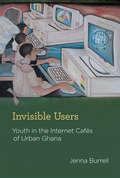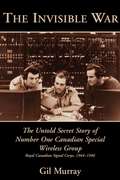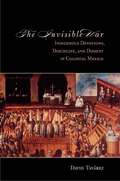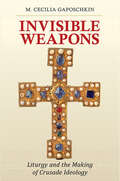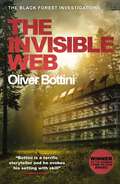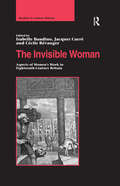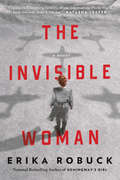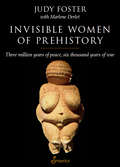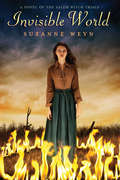- Table View
- List View
The Invisible Palestinians: The Hidden Struggle for Inclusion in Jewish Tel Aviv (Public Cultures of the Middle East and North Africa)
by Andreas HacklWithin the heart of the Jewish city of Tel Aviv, there is a hidden reality—Palestinians who work, study, and live as an unseen minority without access to equal urban citizenship.Grounded in the everyday lives of Palestinians in Tel Aviv, The Invisible Palestinians offers an ethnographic critique of the city's self-proclaimed openness and liberalism. Andreas Hackl reveals that Palestinians' access to the social and economic opportunities afforded in Tel Aviv depends on keeping a low profile, which not only disrupts opportunities for true urban citizenship but also draws opposition from other Palestinians. By looking at the city from the perspective of this hidden urban minority, Hackl uncovers a critical opportunity to imagine and build a more inclusive and just future for Tel Aviv. An important read, The Invisible Palestinians explores the marginalized urban presence of both Palestinian citizens of Israel and Palestinian laborers from the West Bank in this quintessential Jewish Israeli city. Hackl reveals a highly diverse Palestinian population that includes young people, manual workers and middle-class professionals, residents and commuters, students, artists, and activists, as well as members of an underground Palestinian LGBT community who carefully navigate their place in a city that refuses to recognize them.
The Invisible People: How the U.S. Has Slept Through the Global AIDS Pandemic, The Greatest Human Catastrophe of Our Time
by Greg BehrmanThe Invisible People is a revealing and at times shocking look inside the United States's response to one of the greatest catastrophes the world has ever known -- the global AIDS crisis. A true story of politics, bureaucracy, disease, internecine warfare, and negligence, it illustrates that while the pandemic constitutes a profound threat to U.S. economic and security interests, at every turn the United States has failed to act in the face of this pernicious menace. During the past twenty years, more than 65 million people across the globe have become infected with HIV. Already 25 million around the world have died -- more than all of the battle deaths in the twentieth century combined. By decade's end there will be an estimated 25 million AIDS orphans. If trends continue, by 2025, 250 million global HIV-AIDS cases are a distinct possibility. Beyond the ineffable human toll, the pandemic is reshaping the social, economic, and geopolitical dimensions of our world. Eviscerating national economies, creating an entire generation of orphans, and destroying military capacity, the disease is generating pressures that will lead to instability and possibly even state failure and collapse in sub-Saharan Africa. Poised to explode in Eastern Europe, Russia, India, and China, AIDS will have devastating and destabilizing effects of untold proportions that will reverberate throughout the global economy and the international political order. In this gripping account that draws on more than two hundred interviews with key political insiders, policy makers, and thinkers, Greg Behrman chronicles the red tape, colossal blunders, monumental egos, power plays, and human pain and suffering that comprise America's woeful response to the AIDS crisis. Behrman's unprecedented access takes you inside the halls of power from seminal White House meetings to tumultuous turf battles at World Health Organization headquarters in Geneva, heated debates in the United Nations, and chilling discoveries at the Centers for Disease Control. Behrman also brings us into the field to meet the people who live in the midst of AIDS devastation in places like a school yard in Namibia, the red-light district in Bombay, and an orphanage in South Africa. Intensely researched and vividly detailed, The Invisible People is a groundbreaking and compellingly readable account of the appalling destruction caused by more than two decades of American abdication in the face of the defining humanitarian catastrophe of our time.
The Invisible Plague: The Rise of Mental Illness from 1750 to the Present
by E. Fuller Torrey Judy MillerThe prevalence of insanity, which was once considerably less than one case per 1,000 total population, has risen beyond five cases in 1,000. Why has mental illness reached epidemic proportions? What are the causes of severe mental illness?
The Invisible Rainbow: A History of Electricity and Life
by Arthur FirstenbergElectricity has shaped the modern world. But how has it affected our health and environment? Over the last 220 years, society has evolved a universal belief that electricity is ‘safe’ for humanity and the planet. Scientist and journalist Arthur Firstenberg disrupts this conviction by telling the story of electricity in a way it has never been told before—from an environmental point of view—by detailing the effects that this fundamental societal building block has had on our health and our planet. In The Invisible Rainbow, Firstenberg traces the history of electricity from the early eighteenth century to the present, making a compelling case that many environmental problems, as well as the major diseases of industrialized civilization—heart disease, diabetes, and cancer—are related to electrical pollution.
Invisible Romans
by Robert KnappRobert Knapp brings to light the laboring men, housewives, prostitutes, freedmen, slaves, soldiers, and gladiators who formed the backbone of the ancient Roman world, and the outlaws and pirates who lay beyond it. The lives of these invisible Romans emerge from graffiti, incantations, fables, astrological writings, and even the New Testament.
An Invisible Scalpel: Low-Visibility Operations in the War on Terror
by Charles R. V. O’QuinnThe War on Terror (WOT) is actually a war against extremist insurgents comprised of numerous and varied organizations scattered across the globe. They are spurred to action by an extremist ideology that is nurtured, demonstrated, and led by al Qaeda and its leadership. This ideology serves as the insurgency's center of gravity whereby it gains all manner of support across a broad spectrum of functional resources in multiple operational domains. As operating environments change, these ideology inspired decentralized insurgent organizations are able to quickly adapt their methods of operation. In order to defeat this evolving, ubiquitous yet elusive threat, the US must develop a comprehensive strategy that incorporates all instruments of US national power, as well as those of its allies. This strategy must also defeat or mitigate the enemy's center of gravity in order to have any chance of success. This thesis argues that as lead combatant command in the WOT, the US Special Operations Command (USSOCOM) should conduct continuous, global, pre-emptive low-visibility operations in order to disrupt insurgent operations. In order to accomplish its WOT missions, USSOCOM must effectively organize and array forces and resources to defeat insurgent functional resources across multiple operational domains.
The Invisible Siege: The Rise of Coronaviruses and the Search for a Cure
by Dan Werb&“A journey into the origins of COVID-19 and the discovery of vaccines and potential cures . . . I learned so much that I didn&’t know before—above all, I met the subtle warriors of the laboratory who are working to save all of us from the horror of new pandemics.&”—Richard Preston, bestselling author of The Hot Zone and The Demon in the Freezer One of Publishers Weekly&’s top ten science books of the season The urgency of the devastating COVID-19 pandemic has fixed humanity&’s gaze on the present crisis. But the story of this pandemic extends far further back than many realize. In this engrossing narrative, epidemiologist Dan Werb traces the rising threat of the coronavirus family and the attempts by a small group of scientists who worked for decades to stop a looming viral pandemic.When virologist Ralph Baric began researching coronaviruses in the 1980s, the field was a scientific backwater—the few variants that infected humans caused little more than the common cold. But when a novel coronavirus sparked the 2003 SARS epidemic, and then the MERS epidemic a decade later, Baric and his allies realized that time was running out before a pandemic strain would make the inevitable jump from animals to human hosts.In The Invisible Siege, Werb unpacks the dynamic history and microscopic complexity of an organism that has wreaked cycles of havoc upon the world for millennia. Elegantly tracing decades of scientific investigation, Werb&’s book reveals how Baric&’s team of scientists hatched an audacious plan not merely to battle COVID-19 but to end pandemics forever. Yet as they raced to find a cure, they ran into a complicated nexus of science, ethics, industry, and politics that threatened to derail their efforts just as COVID-19 loomed ever larger.The Invisible Siege is an urgent and moving testament to the unprecedented scientific movement to stop COVID-19—and a powerful look at the infuriating factors that threaten to derail discovery and leave the world vulnerable to the inevitable coronaviruses to come.
The Invisible Soldiers: How America Outsourced Our Security
by Ann HagedornThe urgent truth about the privatization of America's national security that exposes where this industry came from, how it operates, where it's heading--and why we should be concerned.Thirty years ago there were no private military and security companies (PMSCs); there were only mercenaries. Now the PMSCs are a bona-fide industry, an indispensable part of American foreign and military policy. PMSCs assist US forces in combat operations and replace them after the military withdraws from combat zones; they guard our embassies; they play key roles in US counterterrorism strategies; and Homeland Security depends on them. Their services include maritime security, police training, drone operations, cyber security, and intelligence analysis (as Edward Snowden has famously revealed). Even the United Nations employs them.When did this happen? The turning point came when the US found itself in a prolonged war with Iraq, but without adequate forces. So the Bush Administration turned to the PMSCs to fill the gap. Private contractors and subcontractors eventually exceeded the traditional troops. The industry has never scaled back. Ann Hagedorn profiles the members of Congress who recognize the dangers of dependence on PMSCs, but have been unable to limit them or even determine their true scope. She takes us to the exclusive club in London where the PMSCs were created, and she reveals the key figure in the evolution of the industry. She introduces us to a US Army general who studies new developments, such as PMSCs' drone operations, and worries about PMSCs potentially fighting American troops. The Invisible Soldiers will inspire a national dialogue about a little-known international industry on which our security rests.
Invisible Sovereign: Imagining Public Opinion from the Revolution to Reconstruction (New Studies in American Intellectual and Cultural History)
by Mark G. SchmellerHow has the idea of public opinion changed since the Revolutionary War—and how has it shaped the nation?In the early American republic, the concept of public opinion was a recent—and ambiguous—invention. While appearing to promise a new style and system of democratic and deliberative politics, the concept was also invoked to limit self-rule, cement traditional prejudices and hierarchies, forestall deliberation, and marginalize dissent. As Americans contested the meaning of this essentially contestable idea, they expanded and contracted the horizons of political possibility and renegotiated the terms of political legitimacy.Tracing the notion of public opinion from its late eighteenth-century origins to the Gilded Age, Mark G. Schmeller’s Invisible Sovereign argues that public opinion is a central catalyst in the history of American political thought. Schmeller treats it as a contagious idea that infected a broad range of discourses and practices in powerful, occasionally ironic, and increasingly contentious ways. Ranging across a wide variety of historical fields, Invisible Sovereign traces a shift over time from early "political-constitutional" concepts, which identified public opinion with a sovereign people and wrapped it in the language of constitutionalism, to more modern, "social-psychological" concepts, which defined public opinion as a product of social action and mass communication.
Invisible Sovereign: Imagining Public Opinion from the Revolution to Reconstruction (New Studies in American Intellectual and Cultural History)
by Mark G. SchmellerThis history of early American political thought examines the emergence, evolution, and manipulation of public opinion. In the early American republic, the concept of public opinion was a recent—and ambiguous—invention. While appearing to promise a new style of democratic politics, the concept was also invoked to limit self-rule, cement traditional prejudices, stall deliberation, and marginalize dissent. As Americans contested the meaning of this essentially contestable idea, they expanded and contracted the horizons of political possibility and renegotiated the terms of political legitimacy. Tracing the concept from its late eighteenth-century origins to the Gilded Age, Mark G. Schmeller&’s Invisible Sovereign argues that public opinion is a central catalyst in the history of American political thought. Schmeller treats it as a contagious idea that infected a broad range of discourses and practices in powerful, occasionally ironic, and increasingly contentious ways. Ranging across a wide variety of historical fields, Invisible Sovereign traces a shift over time from early &“political-constitutional&” concepts, which wrapped pubic opinion in the language of constitutionalism, to more modern, &“social-psychological&” concepts, which defined public opinion as a product of social action and mass communication.
Invisible Stars: A Social History of Women in American Broadcasting
by Donna HalperInvisible Stars was the first book to recognize that women have always played an important part in American electronic media. The emphasis is on social history, as the author skillfully explains how the changing role of women in different eras influenced their participation in broadcasting. This is not just the story of radio stars or broadcast journalists, but a social history of women both on and off the air. Beginning in the early 1920s with the emergence of radio, the book chronicles the ambivalence toward women in broadcasting during the 1930s and 1940s, the gradual change in status of women in the 1950s and 1960s, the increased presence of women in broadcasting in the 1970s, and the successes of women in broadcasting in the 1980s and 1990s. The second edition is expanded to include the social and political changes that occurred in the 2000s, such as the growing number of women talk show hosts; changing attitudes about women in leadership roles in business; more about minority women in media; and women in sports and women sports announcers. The author addresses the question of whether women are in fact no longer invisible in electronic media. She provides an assessment of where progress for women (in society as well as broadcasting) can be seen, and where progress appears totally stalled.
Invisible Storytellers: Voice-Over Narration in American Fiction Film
by Sarah KozloffSarah Kozloff examines and analyzes voice-over narration through examples from films and refutes the assumptions that words should only play a minimal role in film, that "showing" is superior to "telling," or that the technique is inescapably authoritarian.
The Invisible Tent: The War Novels of Ford Madox Ford
by Ambrose Gordon Jr.This critical evaluation of Ford Madox Ford's "novels of war, which are also novels about peace," is made in a most delightful manner. Based on a thorough knowledge of the novelist, it is enriched by keen perception and delicate taste and is couched in an informal, highly readable style. Ambrose Gordon, Jr. , here analyzes seven novels by Ford that in Gordon's opinion constitute Ford's masterpieces: Parade's End (a tetralogy consisting of Some Do Not, No More Parades, A Man Could Stand Up, and The Last Post), The Marsden Case, No Enemy, and The Good Soldier. Interested in what these novels have to say, Gordon is equally interested in how they make their comment, and so approaches them through analysis of the fictional methods that Ford employed. Yet he skillfully avoids a common error of critics who become absorbed in technique-loss of contact with the book itself-by providing numerous quotations of sufficient length to indicate the novels' quality. These passages, examined in detail for content and technique, give the reader an understanding of the novel that, though not a substitute for one's own reading of the narratives, is enhanced by the interpretation of a brilliant critic. Gordon traces the development of the novelist's art in various phases: the characteristic moods and general patterns of his novels, his borrowings from the French, the effects of his association with Conrad, his concept of the novel as fairy tale, his use of scene exteriors and interiors. Gordon's discussion cuts across the seven novels in many aspects but concentrates on one novel, or a group of novels, when his ideas have less general illustration.
Invisible Things
by Jenny DavidsonSixteen-year-old Sophie knows there is more to the story of her parents' death. And she's on a mission to find the truth. To aid her in solving the decades-old mystery, Sophie has enlisted her best friend, Mikael, whose friendship has turned into something more. It's soon clear that Sophie's future is very much wrapped up in the details of her family's past, and the key lies with information only one man can provide: her parents' former employer, the elusive billionaire Alfred Nobel. As the threat of war looms in Europe, dangers to Sophie and her loved ones grow. While her determination to solve the mystery doesn't waver, forces beyond her control conspire to keep her from her purpose. Then, news of her great-aunt Tabitha's death sets off a chain of events that leaves Sophie questioning everything. The more Sophie learns, the more she realizes that nothing--and no one--in her life is what it seems. And coming to terms with the dark secrets she uncovers means imagining a truth that she never dreamed possible. Full of gorgeous settings, thrilling adventure, and romance, invisible things is a novel that dares to ask, what if?
The Invisible Thread: An Autobiography
by Yoshiko UchidaGrowing up in California, Yoshi knew her family looked different from their neighbors. Still, she felt like an American. But everything changed when America went to war against Japan. Along with all the other Japanese-Americans on the West Coast, Yoshi's family were rounded up and imprisoned in a crowded. badly built camp in the desert because they "looked like the enemy." Yoshiko Uchida grew up to be an award-winning author. This memoir of her childhood gives a personal account of a shameful episode in American history.
Invisible Users: Youth in the Internet Cafés of Urban Ghana (Acting with Technology)
by Jenna BurrellAn account of how young people in Ghana's capital city adopt and adapt digital technology in the margins of the global economy.The urban youth frequenting the Internet cafés of Accra, Ghana, who are decidedly not members of their country's elite, use the Internet largely as a way to orchestrate encounters across distance and amass foreign ties—activities once limited to the wealthy, university-educated classes. The Internet, accessed on second-hand computers (castoffs from the United States and Europe), has become for these youths a means of enacting a more cosmopolitan self. In Invisible Users, Jenna Burrell offers a richly observed account of how these Internet enthusiasts have adopted, and adapted to their own priorities, a technological system that was not designed with them in mind.Burrell describes the material space of the urban Internet café and the virtual space of push and pull between young Ghanaians and the foreigners they encounter online; the region's famous 419 scam strategies and the rumors of “big gains” that fuel them; the influential role of churches and theories about how the supernatural operates through the network; and development rhetoric about digital technologies and the future viability of African Internet cafés in the region.Burrell, integrating concepts from science and technology studies and African studies with empirical findings from her own field work in Ghana, captures the interpretive flexibility of technology by users in the margins but also highlights how their invisibility puts limits on their full inclusion into a global network society.
The Invisible War: The Untold Secret Story of Number One Canadian Special Wireless Group
by Gil MurrayWhile the Second World War raged in Europe, demanding most of Canada’s military effort, an equally fierce war with Japan was going on in the Far East. Army, navy, and air force signals units in Canada kept watch on the enemy’s vital radio communications. To be more effective, Number One Canadian Special Wireless Group of the Royal Canadian Signals Corps was formed to go to the Southwest Pacific war theatre for close-in radio eavesdropping. Murray describes the often zany career of the only complete signals unit Canada sent to the War in the Pacific, and the significant part it played in the Allied signals intelligence operation known as "Magic."
The Invisible War: Indigenous Devotions, Discipline, and Dissent in Colonial Mexico
by David TavárezFollowing the conquest of Mexico, colonial authorities tried to force Christian beliefs on the indigenous residents, an initiative they likened to "spiritual warfare.") Author Tavarez (anthropology, Vassar College) provides an assessment of this movement by analyzing all recorded attempts to rid the natives of their own spiritual lives between the 1530s and the late 1700s in central Mexico. He explores major events of the era and how the different indigenous cultures responded to the Spanish attempts to wipe out their spiritual heritage and culture. Annotation ©2011 Book News, Inc., Portland, OR (booknews.com)
Invisible Weapons: Liturgy and the Making of Crusade Ideology
by M. Cecilia GaposchkinThroughout the history of the Crusades, liturgical prayer, masses, and alms were all marshaled in the fight against Muslim armies. In Invisible Weapons, M. Cecilia Gaposchkin focuses on the ways in which Latin Christians communicated their ideas and aspirations for crusade to God through liturgy, how public worship was deployed, and how prayers and masses absorbed the ideals and priorities of crusading. Placing religious texts and practices within the larger narrative of crusading, Gaposchkin offers a new understanding of a crucial facet in the culture of holy war.
The Invisible Web: A Black Forest Investigation V (The Black Forest Investigations #5)
by Oliver BottiniA gripping and atmospheric Black Forest Investigation featuring Detective Inspector Louise Bonì.In a Berlin hotel a man is beaten up, but it's more than a random assault and the attacker escapes undetected. When the trail leads to Freiburg, Chief Inspector Louise Bonì is sent to investigate. It's a complex case, a professional job. The victim is a secret service informer, the only witness knows more than she's saying, and the intelligence service is hovering in the background, refusing to cooperate. Industrial espionage appears to be at play, focused on the booming solar-energy sector."Taut writing and pacy events" Sunday Times Bonì's investigation is repeatedly obstructed, and again she has to rip up the police handbook in her attempt to find out how the different threads of the web tie together. But by the time she discovers the truth, it's already too late for one of those involved . . ."Bottini is a terrific storyteller" Sunday Express The fifth in the Black Forest Investigations featuring Louise Bonì - by the five-time winner of the German Crime Fiction AwardTranslated from the German by Jamie Bulloch
The Invisible Web: A Black Forest Investigation V (The Black Forest Investigations #5)
by Oliver BottiniA gripping and atmospheric Black Forest Investigation featuring Detective Inspector Louise Bonì.In a Berlin hotel a man is beaten up, but it's more than a random assault and the attacker escapes undetected. When the trail leads to Freiburg, Chief Inspector Louise Bonì is sent to investigate. It's a complex case, a professional job. The victim is a secret service informer, the only witness knows more than she's saying, and the intelligence service is hovering in the background, refusing to cooperate. Industrial espionage appears to be at play, focused on the booming solar-energy sector."Taut writing and pacy events" Sunday Times Bonì's investigation is repeatedly obstructed, and again she has to rip up the police handbook in her attempt to find out how the different threads of the web tie together. But by the time she discovers the truth, it's already too late for one of those involved . . ."Bottini is a terrific storyteller" Sunday Express The fifth in the Black Forest Investigations featuring Louise Bonì - by the five-time winner of the German Crime Fiction AwardTranslated from the German by Jamie Bulloch
The Invisible Woman: Aspects of Women's Work in Eighteenth-Century Britain (Studies in Labour History)
by Isabelle Baudino Jacques CarréMost social historians writing about working women in pre-nineteenth century Britain have tended to concentrate on fairly large groups, such as factory workers or domestic servants, often in an attempt to reach some conclusions regarding their standards of living and social position. Another approach has lead feminist historians to search for underlying causes of women's exploitation through the locus of class and gender. Without ignoring these crucial issues, this volume written by cultural historians takes a slightly different approach, focusing on the status of small, sometimes tiny, groups of women holding marginal positions in the labour market, and often employed on an irregular basis. Women such as housekeepers, nurses, camp followers, governesses, actresses and musicians, to take some of the cases examined in this volume, generally did not have stable, permanent employment. Even female tradesmen often only worked for short periods of their lives. The temporary, unreliable character of such work can be partly related to the changing needs of women at different periods of their lives, but it also has much to do the status of women's work in eighteenth century British society. Providing case-studies of women's work in three different environments - middle and upper class households, male dominated communities and societies and the world of the arts - this collection asks fresh questions about women's aspirations and identity at various levels of society. In comparing and contrasting these varying spheres of female employment, this book throws in sharp relief the contrasting attitude to women's work inside and outside the home, and how the latter was often regarded as having a potentially destabilising and transgressive effect on British society.
The Invisible Woman
by Erika Robuck&“An extraordinary profile of immense courage and daring.&”—Chanel Cleeton, New York Times bestselling author of Before We Left Cuba &“If you only read one WWII book this year, make it this one."—Natasha Lester, New York Times bestselling author of The Paris Orphans In the depths of war, she would defy the odds to help liberate a nation…a gripping historical novel based on the remarkable true story of World War II heroine Virginia Hall, from the bestselling author of Hemingway&’s Girl France, March 1944. Virginia Hall wasn't like the other young society women back home in Baltimore—she never wanted the debutante ball or silk gloves. Instead, she traded a safe life for adventure in Europe, and when her beloved second home is thrust into the dark days of war, she leaps in headfirst.Once she's recruited as an Allied spy, subverting the Nazis becomes her calling. But even the most cunning agent can be bested, and in wartime trusting the wrong person can prove fatal. Virginia is haunted every day by the betrayal that ravaged her first operation, and will do everything in her power to avenge the brave people she lost.While her future is anything but certain, this time more than ever Virginia knows that failure is not an option. Especially when she discovers what—and whom—she's truly protecting.
Invisible Women of Prehistory: Three Million Years of Peace, Six Thousand Years of War
by Marlene Derlet Judy FosterBased on many years of research into ancient history and prehistory, this insightful tome argues that three million years of peace--a period when women's status in society was much higher than it is now--preceded the last 6,000 years of war during which men have come to hold power over women. The book challenges the idea accepted in academia that history is a linear development in which society is steadily moving out of a violent and patriarchal past to a more equitable and peaceful future, and it reexamines both the archaeological work of Marjia Gimbutas and recent research into the prehistories of Africa, Asia, the Americas, and Australia and Oceania.
Invisible World
by Suzanne WeynSuzanne Weyn brings her trademark mix of history, romance, and the supernatural to the Salem Witch Trials. For 15-year-old Sarah Owen, having a scientist father is a blessing and a curse. He doesn't bat an eye at her pyschic abilities, since he researches them; and she knows more about the invisible worlds of microbes, electricity, and gravity than most girls in the 17th Century. But when Sarah travels to the Americas with her father to do more research, she's shipwrecked and lands for a time on the Gullah Islands. Later, when the plantation owners find her and send her north to Salem, Massachusetts, her abilities get her into trouble. Can Sarah save herself when she's accused of witchcraft? Or will she and the rest of the innocents she's accused with be found guilty...and sentenced to hanging?

